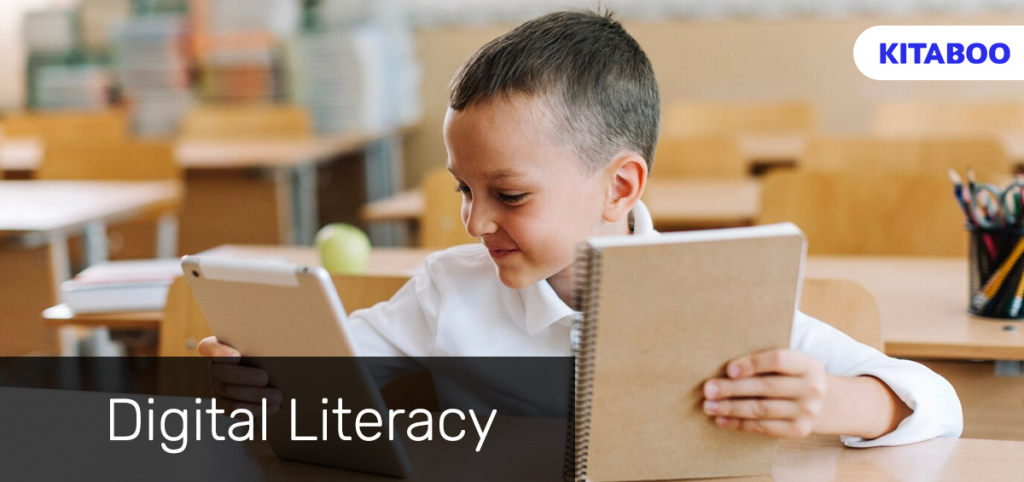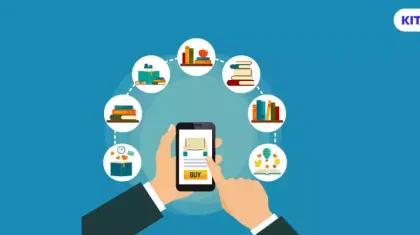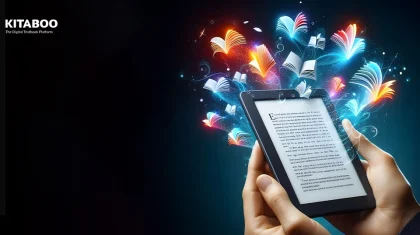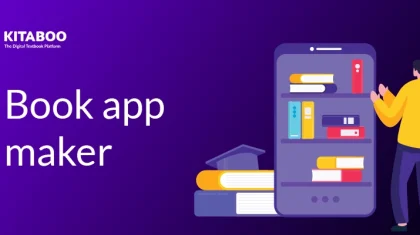
Digital Literacy in the Age of Information: Ensuring Credible Content
Summarize this blog with your favorite AI:
Technology has helped humankind achieve rapid developments over the years. It is the art and science of learning, the curiosity to know the unknown, that has propelled us to achieve the unachievable.
The divide between the developed and the developing depended on access and the ability to judiciously use technological resources. Fast forward to today, the lines of this divide have blurred, and the onus is on ‘digital literacy.’
Thanks to revolutionary technological marvels like KITABOO, learning in general and digital learning, in particular, is as easy as a breeze.
Table of Content
II. Why is Digital Literacy Important in the Modern Age?
What is Digital Literacy?
Literacy is often regarded as a puzzle piece that is difficult to fit into the evolving jigsaws of information dissemination.
Back in the 1980s, ‘computer literacy’ referred to a term that enabled a user to effectively operate a computer device. It was a basic terminology that determined whether one could operate basic software tools and other operational actions on a computer.
However, with the rapid advancements in technology, the term’ computer literacy’ became obsolete. As the channels of information spread grew multifold and information access was more digitalized, ‘digital literacy‘ became the norm.
Digital literacy today is not confirmed by the accumulation and retrieval of information. It paints a holistic picture of infotainment (information and entertainment) and marks an individual’s ability to carefully navigate across these multiple channels.
Furthermore, the style of sharing information has also undergone sea changes. Cloud-based digital publishing platforms have created ripples in the realm of information technology.
If you’re an educator grappling with poor academic records of your wards, try to revamp your pedagogy by leveraging the prowess of innovative learning solutions that are up for grabs.
Why is Digital Literacy Important in the Modern Age?
According to a report released by Statista, the global average internet penetration rate is roughly 65.7%. The standard definition of literacy as the ability of an individual to read and write has undergone comprehensive transformations.
Thanks to the introduction of Information Communication Technologies (ICTs), the pathways of information spread have largely been governed by the internet. Thus, we can carefully navigate through the social networking channels that are bound to make a difference.
Communication was the primary purpose behind the introduction of mobile devices back in the 1970s. Digital literacy, or rather, mobile literacy at that point, was conformed to the ability of dialing numbers.
However, with the constant upgrades and technological advancements, the digital engagement channels underwent a paradigm shift. Thus, it is imperative to keep pace with this transformational journey and to adapt and equip oneself with the evolving definitions of digital literacy.
Tips to Improve Digital Literacy
In today’s ever-evolving digital landscape, information is readily available to us at our fingertips.
But the million-dollar question is, do we have the skill sets to segregate misinformation from information? It further unveils the imbroglio of using the right tools to attract the right audience.
The trick lies in distinguishing credible information from irrelevant or misleading content. It is also about incorporating the perfect digital tools into your repertoire. Let’s have a closer look at some of the strategies to discern credible information from misinformation.
1. Understanding Digital Literacy
In this era of information overload, it is imperative to cultivate the skill set of digital literacy. But before entering into the infinite sea of digital information, it is crucial to analyze your understanding of digital literacy.
You may be scrolling through several pages on the internet daily. But have you ever taken a moment to apply your wits to the authenticity of the content you consume?
Therefore, it is important to develop a solid level of understanding and clarity regarding digital literacy in the digital world. It is a no-brainer that individuals, brands, and other entities overload you with fake or biased information.
2. Upgrading your Digital Textbooks
K12 Educational institutions are the focal point of learning. However, the sector has traditionally been hesitant to introduce avant-garde technologies. Such a trend is likely to impede the progress that we have achieved as a society.
It is high time we incorporated the latest K12 digital innovations into our pedagogy. Traditional eBooks can be replaced with interactive digital textbooks that are time-tested and feature-driven.
Stopping with K12 digital textbooks is not enough. In an age of dwindling attention spans, modern educators need modern solutions. Remember, the average bounce rate is about 15 seconds.
Therefore, it has become the need of the hour to incorporate cutting-edge solutions that can engage the students, thereby elevating their overall digital learning experience.
3. Avoiding Biased Decisions
Digital propaganda of the modern world is crafted with conviction and finesse. You may fall prey and admire a certain ideology within no time.
The internet can be a slippery slope, considering the sheer volume of misinformation and biased propaganda on distribution. We have to sharpen our analytical skills and develop a keen and critical eye for examining biased narratives.
Try to think from a neutral perspective, fact-check, and verify your choices to make informed decisions that go a long way.
At this juncture, customized eBooks, backed by powerful analytical tools, are a blessing in disguise for modern educators. With these innovative solutions, students will be constantly updated and less prejudiced than ever before.
4. Connecting and Collaborating
Social media platforms extend infinite pathways for people to connect and collaborate on multiple issues. As two heads are always better than one, initiating open conversations on pressing issues can foster improved decision-making.
Furthermore, mutual connection and collaboration are integral ingredients of fostering a culture of coordinative growth.
When you share similar ideas or express constructive criticism on contrasting ideologies, you open up yourself to many possibilities. Instead of unquestioningly accepting half-baked truths, connecting and collaborating with your fellow netizens and colleagues can help create concrete, informed decisions.
Modern educators can incorporate multimedia content and share the same with fellow educators to develop an immersive learning experience.
Furthermore, modern platforms like KITABOO are backed by the latest technologies like Artificial Intelligence, Machine learning, and Augmented Reality. Spreading the word about such revolutionary pieces of technology will uplift the standards of digital literacy in the modern age.
5. Learn, Unlearn, Relearn
We are living in an age where change is the only constant. To stay in the hunt for digital literacy, you have to develop a sense of keenness to be constantly updated. You should make it a point to learn, unlearn, and relearn.
Learning is a lifelong process. To stay updated on the latest proceedings of the world around you, you should adapt and update yourself constantly. As responsible individuals who are digitally literate, you must keep a weather eye on the latest trends and technologies and foster a culture of learning and growth.
Conclusion
Attaining digital literacy is more of a journey than a one-stop destination. The little steps we take today can go a long way in creating a well-informed, digitally competent society that graciously discerns credible information from misinformation.
Unleash the infinite potential of interactive K12 learning with KITABOO, your one-stop solution for an immersive, personalized learning experience. Click here to ‘learn’ more and be smarter.
To know further, write to us at contact@web-staging.kitaboo.com.
Discover how a mobile-first training platform can help your organization.
KITABOO is a cloud-based platform to create, deliver & track mobile-first interactive training content.


